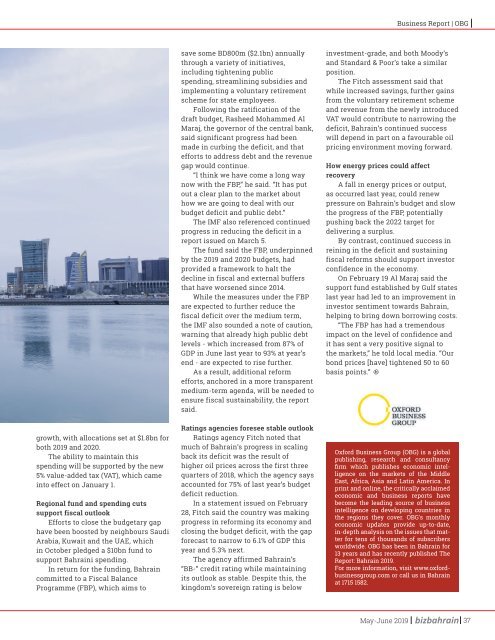Create successful ePaper yourself
Turn your PDF publications into a flip-book with our unique Google optimized e-Paper software.
Business Report | OBG<br />
save some BD800m ($2.1bn) annually<br />
through a variety of initiatives,<br />
including tightening public<br />
spending, streamlining subsidies and<br />
implementing a voluntary retirement<br />
scheme for state employees.<br />
Following the ratification of the<br />
draft budget, Rasheed Mohammed Al<br />
Maraj, the governor of the central bank,<br />
said significant progress had been<br />
made in curbing the deficit, and that<br />
efforts to address debt and the revenue<br />
gap would continue.<br />
“I think we have come a long way<br />
now with the FBP,” he said. “It has put<br />
out a clear plan to the market about<br />
how we are going to deal with our<br />
budget deficit and public debt.”<br />
The IMF also referenced continued<br />
progress in reducing the deficit in a<br />
report issued on March 5.<br />
The fund said the FBP, underpinned<br />
by the <strong>2019</strong> and 2020 budgets, had<br />
provided a framework to halt the<br />
decline in fiscal and external buffers<br />
that have worsened since 2014.<br />
While the measures under the FBP<br />
are expected to further reduce the<br />
fiscal deficit over the medium term,<br />
the IMF also sounded a note of caution,<br />
warning that already high public debt<br />
levels - which increased from 87% of<br />
GDP in <strong>June</strong> last year to 93% at year’s<br />
end - are expected to rise further.<br />
As a result, additional reform<br />
efforts, anchored in a more transparent<br />
medium-term agenda, will be needed to<br />
ensure fiscal sustainability, the report<br />
said.<br />
investment-grade, and both Moody’s<br />
and Standard & Poor’s take a similar<br />
position.<br />
The Fitch assessment said that<br />
while increased savings, further gains<br />
from the voluntary retirement scheme<br />
and revenue from the newly introduced<br />
VAT would contribute to narrowing the<br />
deficit, Bahrain’s continued success<br />
will depend in part on a favourable oil<br />
pricing environment moving forward.<br />
How energy prices could affect<br />
recovery<br />
A fall in energy prices or output,<br />
as occurred last year, could renew<br />
pressure on Bahrain’s budget and slow<br />
the progress of the FBP, potentially<br />
pushing back the 2022 target for<br />
delivering a surplus.<br />
By contrast, continued success in<br />
reining in the deficit and sustaining<br />
fiscal reforms should support investor<br />
confidence in the economy.<br />
On February 19 Al Maraj said the<br />
support fund established by Gulf states<br />
last year had led to an improvement in<br />
investor sentiment towards Bahrain,<br />
helping to bring down borrowing costs.<br />
“The FBP has had a tremendous<br />
impact on the level of confidence and<br />
it has sent a very positive signal to<br />
the markets,” he told local media. “Our<br />
bond prices [have] tightened 50 to 60<br />
basis points.”<br />
growth, with allocations set at $1.8bn for<br />
both <strong>2019</strong> and 2020.<br />
The ability to maintain this<br />
spending will be supported by the new<br />
5% value-added tax (VAT), which came<br />
into effect on January 1.<br />
Regional fund and spending cuts<br />
support fiscal outlook<br />
Efforts to close the budgetary gap<br />
have been boosted by neighbours Saudi<br />
Arabia, Kuwait and the UAE, which<br />
in October pledged a $10bn fund to<br />
support Bahraini spending.<br />
In return for the funding, Bahrain<br />
committed to a Fiscal Balance<br />
Programme (FBP), which aims to<br />
Ratings agencies foresee stable outlook<br />
Ratings agency Fitch noted that<br />
much of Bahrain’s progress in scaling<br />
back its deficit was the result of<br />
higher oil prices across the first three<br />
quarters of 2018, which the agency says<br />
accounted for 75% of last year’s budget<br />
deficit reduction.<br />
In a statement issued on February<br />
28, Fitch said the country was making<br />
progress in reforming its economy and<br />
closing the budget deficit, with the gap<br />
forecast to narrow to 6.1% of GDP this<br />
year and 5.3% next.<br />
The agency affirmed Bahrain’s<br />
“BB-” credit rating while maintaining<br />
its outlook as stable. Despite this, the<br />
kingdom’s sovereign rating is below<br />
Oxford Business Group (OBG) is a global<br />
publishing, research and consultancy<br />
firm which publishes economic intelligence<br />
on the markets of the Middle<br />
East, Africa, Asia and Latin America. In<br />
print and online, the critically acclaimed<br />
economic and business reports have<br />
become the leading source of business<br />
intelligence on developing countries in<br />
the regions they cover. OBG's monthly<br />
economic updates provide up-to-date,<br />
in-depth analysis on the issues that matter<br />
for tens of thousands of subscribers<br />
worldwide. OBG has been in Bahrain for<br />
13 years and has recently published The<br />
Report: Bahrain <strong>2019</strong>.<br />
For more information, visit www.oxfordbusinessgroup.com<br />
or call us in Bahrain<br />
at 1715 1582.<br />
<strong>May</strong>-<strong>June</strong> <strong>2019</strong><br />
37
















